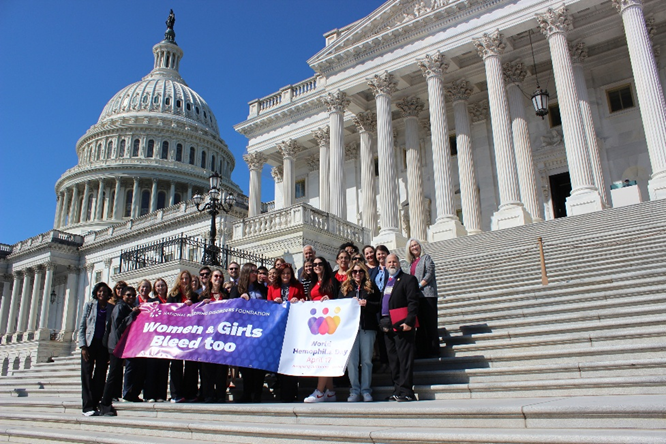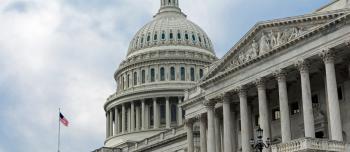Federal:
Day of Awareness on Capitol Hill for Women and Girls with Bleeding Disorders
On April 17, NBDF was joined by the Hemophilia Federation of America, Hemophilia Alliance, Coalition for Hemophilia B, FAIR Time for Women Coalition, and Hope for Hemophilia for a day on Capitol Hill to raise awareness for women and girls living with bleeding disorders. April 17 was World Hemophilia Day, a worldwide awareness initiative, which this year centered on the experience of women and girls with bleeding disorders. Advocates met with over eighty Congressional offices to provide education and seek Congressional champions for legislation to address many of the barriers faced by women and girls living with bleeding disorders. Advocates also asked lawmakers to support bleeding disorders programs and funding at federal agencies (CDC and HRSA), noting that preservation of those programs is essential as we seek to expand access to diagnosis, care, and research for women, girls, and other underserved populations with bleeding disorders. Earlier in the month, NBDF joined the American Society of Hematology and over 90 other blood and bleeding disorder groups calling on HHS Secretary Kennedy to restore the CDC’s Division of Blood Disorders and Public Health Genomics.

The Fight to Protect Medicaid
NBDF, alongside partner organizations, continues to engage with policymakers on the importance of Medicaid to the bleeding disorders community. Congress is moving forward on a reconciliation bill which has the potential to make drastic cuts to the Medicaid program and/or establish harmful policies, such as work reporting requirements. Approximately one-third of the bleeding disorders community is insured by Medicaid and any cut or new administrative barrier to eligibility would result in loss of coverage for many across the U.S. Currently, NBDF is working in collaboration with other national bleeding disorders groups on messaging to members of the House Energy and Commerce Committee, ahead of an upcoming Committee vote on the reconciliation bill.
President’s Draft FY2026 Budget Leaked
On April 16, a draft of the President’s proposed budget for FY 2026 was leaked. The document, known as a “passback,” aligned with HHS’s March 2025 “Transformation” plan to eliminate numerous public health programs across the federal government, but appears to maintain funding for the three federal programs dedicated to bleeding disorders. The President’s Budget typically is a messaging document as Congress has the final say on what programs will be funded and at what level, but NBDF will continue to watch this process closely and engage when needed.
Executive Order on Lowering Cost of Prescription Drugs
On April 15, President Trump issued an Executive Order (EO) aimed at lowering prescription drug prices. The EO builds on policies President Trump attempted under his first term and calls for modifications to the Medicare Drug Price Negotiation Program. It also touches on popular topics like greater transparency for pharmacy benefit managers (PBMs) and site neutrality. While the EO does not provide details on many of the proposals included, NBDF will watch out for regulation and/or guidance issued as a result of this.
State:
Arizona: H.B. 2380, which would create a Rare Disease Advisory Council, passed the Senate and was sent back to the House April 29 for concurrence with the Senate amended version.
Indiana: HB 1604, Indiana’s pharmacy benefit manager (PBM) reform legislation, which contains a ban on copay accumulators, passed the House and Senate on April 22. It now goes to Gov. Braun for signature. With the Governor’s signature, Indiana would be the 23rd state to ban copay accumulator adjusters on state-regulated plans.
Maryland: SB 773, the State’s copay accumulator bill, passed the General Assembly on April 7. It awaits the signature of Gov. Moore.
Massachusetts: H 1101 and S 698, the Commonwealth’s copay accumulator adjuster legislation, were introduced and are set to be heard in the Joint Committee on Financial Services on April 30. The New England Hemophilia Association organized representatives from the bleeding disorders and chronic disease community to testify in person.
Montana: H.B. 943, the State’s Rare Disease Advisory Council bill, passed the House and Senate this month and awaits Gov. Gianforte’s signature.
Nevada: The Senate Committee on Commerce and Labor passed S.B. 316, a PBM reform bill, April 18. The committee amended the bill and included a ban on copay accumulator adjusters. Following the NBDF Nevada Chapter Advocacy Day March 26 NBDF staff met with bill sponsor Sen. Nguyen to discuss adding the AAP ban language to the bill.
North Dakota: On April 29, Gov. Armstrong signed H.B. 1216 into law making North Dakota the 22nd state to ban copay accumulator adjusters. The law is the first in the country to ban copay maximizers as well.
Pennsylvania: In April, the Eastern and Western Pennsylvania Bleeding Disorders Foundations alongside HTC representatives and NBDF met with Pennsylvania Insurance Commissioner Michael Humphrey to discuss the group’s concerns on a variety of issues including prior authorization, step therapy, Medicaid, and copay accumulator adjuster policies.
Rhode Island: SB 477, the State’s copay accumulator legislation, will be heard in the Senate Committee on Health and Human Services on May 1.
South Carolina: H 3934, the State’s copay accumulator adjuster legislation, is due for a hearing in early May in the House Labor, Commerce, and Industry Committee. During the month of April, the Bleeding Disorders Association of South Carolina was able to secure over one hundred cosponsors for the legislation.
Wisconsin: On April 9, Reps. Novak and Tranel introduced a PBM reform bill, A.B. 173, that includes a ban on copay accumulator adjusters. Sen. Felzkowski introduced her companion legislation, S.B. 203, April 16.





